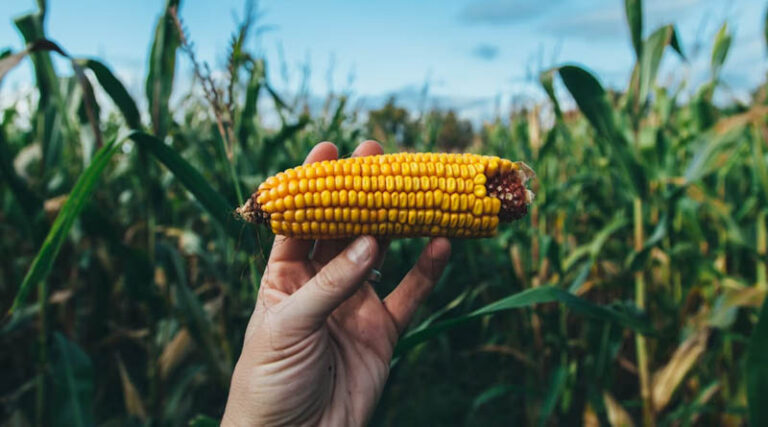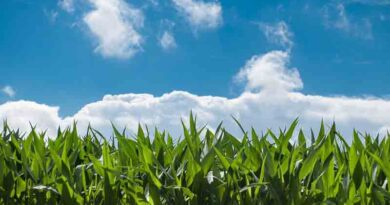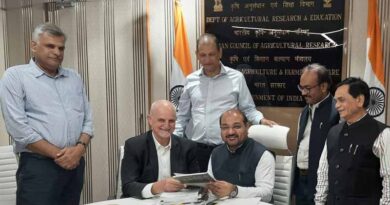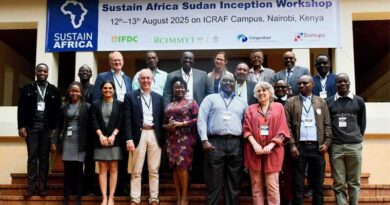
GMOs and Nigeria’s Food Future: New Generation of Agricultural Experts Weigh In
Guest Author: Joel Emmanuel Benson, African Agricultural Scientist
24 August 2025, New Delhi: The debate on Genetically Modified Organisms (GMOs) or Genetically Modified Food (GMF) in Nigeria spans science, policy, farming, and social media. GMOs are seen by many as a path to increased food security, while others worry about the survival of traditional seeds and indigenous farming systems.
What do the new generation of agricultural professionals think?
Oguibe Promise Chikaosoro, a Modern Greenhouse Farmer and Farm Manager, believes GMOs could offer higher yields, pest and drought resistance, and reduced post-harvest losses. Yet she warns these benefits come with risks if indigenous seeds are abandoned. In her words, “If seed supply becomes dependent on foreign companies, especially during political or trade conflicts, our food security could be at risk.”
For her, the way forward is clear: GMOs should be developed in Nigeria, managed locally, and supported by strong biosafety regulations, farmer education, and the preservation of local crop diversity. “Policymakers should ensure that innovation strengthens, rather than weakens, our sovereignty over the future of food,” she adds.
Building on these concerns, Soliu Asmau Olayinka, an Agricultural Economist, believes that GMOs should be evaluated on a case-by-case basis, with their potential benefits weighed against associated risks, while also considering the local agricultural and socio-economic context before deciding on adoption.
While current GMOs are considered safe, she stresses the importance of further research: “There is still a need for long-term, independent studies on their ecological impacts, particularly on biodiversity and non-target organisms in Nigeria’s unique ecosystems.”
To ensure safe deployment, Asmau advocates robust regulatory frameworks, investment in research, and inclusive stakeholder engagement. “Policymakers should implement strong regulations, invest in research, and engage farmers, scientists, and civil society. Public institutions, alongside private corporations, must be involved in GMO research. Farmer education and extension services should help producers make informed choices, rather than being swayed by market pressures or misinformation.”
Ultimately, she concludes, “The question is not whether Nigeria should embrace or reject GMOs, but whether we can create an agricultural innovation system that leverages biotechnology responsibly. If adopted without adequate safeguards, GMOs could deepen dependency and erode trust in the food system. The future of Nigerian agriculture depends on finding this balance.”
Rasheed Daramola Ibrahim, a Crop Scientist, urges even stronger caution. “GMOs might mix with local plants through wind or insects, potentially destroying traditional varieties that survive Nigerian conditions. Once lost, these varieties cannot be recovered,” he explains. Some GMOs also require strong chemicals that harm soil, kill beneficial insects like bees, and pollute water. “Our ancestors farmed successfully without these chemicals for centuries,” he notes.
He also warns of dependence on foreign seed companies. “Most GMO seeds come from multinational corporations that own patents. Farmers cannot save or replant them and must buy new seeds each season. If these companies stop selling, Nigeria could face serious hunger.”
For Ibrahim, local crops offer safer solutions. “Nigerian scientists and farmers have developed varieties that survive droughts, floods, and local diseases without costly chemicals. GMO seeds are more expensive and may not suit our environment.”
He cautions that adopting GMOs could erode centuries of farming wisdom. “We could lose knowledge about traditional seeds, food storage methods, local varieties with unique nutritional benefits, and cultural farming practices.”
Instead, he advocates investing in local systems: “Nigeria should focus on improving traditional farming, teaching farmers better methods with local crops, providing irrigation, transportation, and storage facilities, supporting research on indigenous varieties, addressing insecurity, and ensuring fair prices for farmers.”
He adds, “We should train more crop scientists, build research centers, and share knowledge between researchers and farmers. Our local seeds have been improving for thousands of years. Instead of importing GMOs, universities can continue research and breeding.”
Finally, he emphasizes self-reliance: “Nigeria should not rush into accepting GMO seeds. The risks to our environment, independence, and food security are too great. Instead of depending on foreign companies, we should invest in our own farmers, our own crops, and our own research. This is the path to true food security and independence.”
As Nigeria continues to shape its agricultural policies, the voices of young professionals remind us that GMOs are not only about science or politics, but about people, choices, and the future of food in Nigeria.
Also Read: Delhi High Court Eases Rules for Biostimulant Companies, Ensures Supply for Farmers
📢 If You’re in Agriculture, Make Sure the Right People Hear Your Story.
From product launches to strategic announcements, Global Agriculture offers unmatched visibility across international agri-business markets. Connect with us at pr@global-agriculture.com to explore editorial and advertising opportunities that reach the right audience, worldwide.






